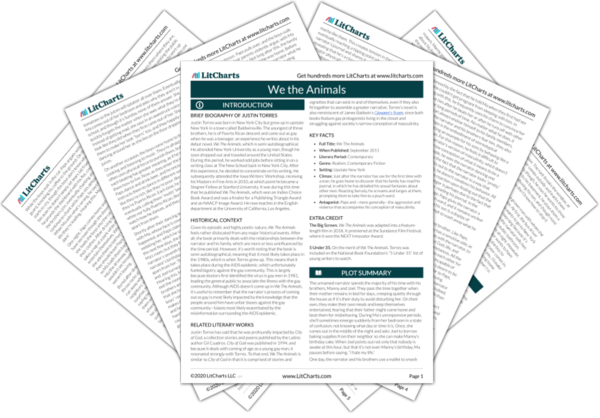Throughout We The Animals, Torres occasionally likens the characters to animals, using this metaphor as a way of representing their relationship with masculinity. In particular, he often describes Paps in animalistic terms, framing him as a strong, instinctive person who gives himself over to the kind of aggression and wildness frequently associated with the natural world and the animal kingdom. Manny and Joel match this animalistic intensity, clearly believing that this is what it means to be a man. The narrator, however, doesn’t always align with this way of moving through the world, since he doesn’t share his father’s and brothers’ macho disposition. And yet, the final chapter describes him as living in a zoo surrounded by other animals. This implies that the narrator is an animal, despite the fact that he’s different from his brothers and father. If being an animal represents masculinity, then, this means that there’s more than just one iteration of the male identity. Unfortunately for the narrator, though, he lives in captivity with his fellow animals, ultimately suggesting that his version of manhood is not yet widely accepted by society, which favors his family’s stereotypical conception of what it means to be a man.
Animals Quotes in We the Animals
I yelled for them to stop, that’s all I did, yelled that one word over and over, stop, stop, stop. I thought of Ma, whispering that same stop, stop, stop to our father. Manny sucked down the snot from his nose into his throat and spat a lugie in Joel’s face, and the mucus slid off, like egg yolk.
“Animals,” said Old Man, “animals.”

Unlock explanations and citation info for this and every other We the Animals quote.
Plus so much more...
Get LitCharts A+Then we were all three kicking and slapping at once, and they didn’t say a word, they didn’t even move; the only noise was the noise of skin and impact and breath, and then our protests, why don’t you come find us, why don’t you do what you’re supposed to do, come and find us, why don’t ya, because you’re bad, bad, bad, bad, bad, why don’t you do right, why can’t you do right, we hate you, come and find us, we hate you, everyone hates you, you better come and find us, next time, next time you better come.
We hit and we kept on hitting; we were allowed to be what we were, frightened and vengeful—little animals, clawing at what we needed.












